Posted on Wednesday, June 17th, 2020
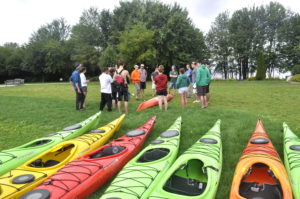
In the summer of 1999, Kent MacDonald jumped into a raft at Wilderness Tours resort. It was his first time rafting the Ottawa River and an opportunity to learn more about what a potential student experience would be like if his academic department pursued an Outdoor education program. MacDonald was the Chair of the Business and Technology department at Algonquin College’s Pembroke Campus and knew that the campus was exploring new opportunities to grow its enrolments. One of the ideas on the table was an outdoor education program that would support the growing adventure tourism sector.
MacDonald was a visionary, a big thinker and an entrepreneur, personality traits that would propel him to the presidency of three institutions during his career, Algonquin College, St. Francis Xavier University and now Northwood University in Michigan. On that hot, sunny day on the Ottawa River, MacDonald was envisioning what the program could look like and how a partnership with the private sector would be needed to make it financially viable.
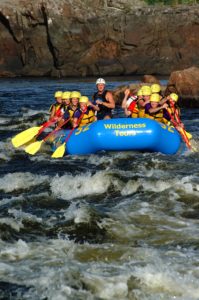
With a senior guide steering the raft through the rapids, the flat water sections of the river provided ample opportunity for MacDonald to ask questions. He wanted to know about the needs of the industry, the growth in rafting trips and the infrastructure that was available at Wilderness Tours for student learning? By the time the trip was over, he was sitting across the table from the owner of Wilderness Tours, Joe Kowalski, and discussions were underway on how the College and adventure company could jointly build a program that would produce graduates with both practical skills and business acumen that would advance the adventure tourism sector.
“I had no reservations. We developed the program together with the professional team at Wilderness Tours. Each of us knew what each institution was able to bring to the table. We were both committed to quality and safety, and Wilderness Tours could do a better job than we could, in terms of providing industry expertise, risk management, outstanding facilities and equipment and of course, excellent contacts within the industry for our students to obtain employment. It was a perfect scenario and an opportunity that was obvious in my view,” says MacDonald.
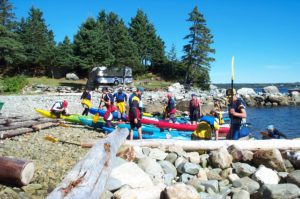 Like MacDonald, Kowalski saw the potential in a partnership with the College. “This was exactly what the industry needed. It helped bring credibility to the adventure tourism sector and we were very proud to be pioneers with Algonquin College in developing the most successful Outdoor Adventure program on the planet,” says Kowalski who himself is into his fifth decade of owning an adventure tourism business.
Like MacDonald, Kowalski saw the potential in a partnership with the College. “This was exactly what the industry needed. It helped bring credibility to the adventure tourism sector and we were very proud to be pioneers with Algonquin College in developing the most successful Outdoor Adventure program on the planet,” says Kowalski who himself is into his fifth decade of owning an adventure tourism business.
Over the next few weeks, MacDonald and Kowalski would meet often, bringing their teams together to hammer out the details of what the program would entail. By the time the fall of 1999 rolled around, the pieces were in place. Students would spend two days a week at Wilderness Tours and Mount Pakenham, which Kowalski jointly owned, and three days a week on campus learning business fundamentals that would apply to adventure tourism.
Courses like risk management, accounting, finance, marketing and communication skills would be taught, but the big attraction to students would be the opportunity to earn more than 20 industry-recognized certifications while learning practical skills like whitewater rafting and kayaking, mountain biking, rock and ice climbing and scuba diving. It was truly the most exhilarating college program on earth and not surprisingly it was an overwhelming success when it launched in the fall of 2000.
With only 40 spaces available in its first intake, the program attracted almost 250 applications. Through a competitive process applicants needed to meet academic requirements for English and Math, needed to submit letters of intent and reference letters to describe the attributes they would bring to the program, and participate in a program readiness camp. Two decades later, those same requirements continue to be part of the admissions process and the program continues to attract students from across the country, and in some cases international destinations.
 Among the students who enrolled that first year was Ben Shillington who had no intention of continuing on to post-secondary education. ” Upon graduation from high school, my plan was to bicycle solo and self-supported across Canada. After arriving on the West Coast, I planned to find a place to train in both whitewater rafting and mountaineering. Shortly before graduating high school, my guidance counsellor gave me a sheet of paper highlighting a new program still pending approval called “Outdoor Adventure Guide Diploma” With a list of training and certification in everything from mountain biking to scuba diving and ice climbing along with some in-class education I couldn’t think of a better bang for buck opportunity.”
Among the students who enrolled that first year was Ben Shillington who had no intention of continuing on to post-secondary education. ” Upon graduation from high school, my plan was to bicycle solo and self-supported across Canada. After arriving on the West Coast, I planned to find a place to train in both whitewater rafting and mountaineering. Shortly before graduating high school, my guidance counsellor gave me a sheet of paper highlighting a new program still pending approval called “Outdoor Adventure Guide Diploma” With a list of training and certification in everything from mountain biking to scuba diving and ice climbing along with some in-class education I couldn’t think of a better bang for buck opportunity.”
Twenty years later, Shillington is perhaps the most adventurous graduate the program has ever produced. His adventures started right after he completed the program. Shillington followed through on his plan to bike solo across the country. He then became a whitewater raft guide that summer while also climbing and filming a two-month mountaineering expedition in the Himalayas as part of an adventure documentary series for the Discovery Channel.
There’s not much Shillington hasn’t done in the adventure world. His long list of adventures includes working, travelling and training in 28 countries, three summits of Mount Kilimanjaro, a three-week ski expedition on one of the coldest places on earth in the winter – Lake Winnipeg, an 11,000-kilometre bike expedition from Istanbul, Turkey to Beijing, China and the list goes on. Shillington has also written a book on winter camping and he continues to be a lead practical skills trainer for the program that changed his point of view on post-secondary education.
When he speaks about the program and what it meant to his development as an adventure guide, Shillington simply says. “What you put into it, is what you will get out of it.”
The idea for an outdoor education program was first brought forward by Dawn Dubé, who was the Manager of Community and Student Affairs at the Pembroke Campus during the 1990’s. She had watched her son and his friends embrace adventure activities and felt strongly that there was room in the marketplace for a college program that would teach these skills for the emerging adventure tourism industry. She brought the suggestion to the attention of Campus Dean, Marguerite Donohue, who also thought it was a good idea. When MacDonald joined the campus management group in 1998 he was given the task of bringing the idea to fruition.
When the Outdoor Adventure program started, the Pembroke Campus of Algonquin College had about 500 full-time students. Its impact on the campus can not be understated. The program’s ability to attract out-of-town students opened a door for the campus to launch other outdoor training programs, resulting in significant enrolment growth that helped contribute to the 2012 opening of a new Waterfront Campus along the shores of the Ottawa River and adjacent to Pembroke’s downtown.
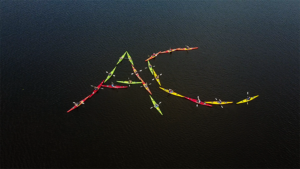
Twenty years after the Outdoor Adventure program helped the Pembroke Campus become a destination for college-bound students who wanted to experience a program like no other in the province at the time, the program has become a flagship program for the campus. It has produced graduates that work all around the world, many of whom have started their own adventure businesses, a primary goal of MacDonald’s when he signed off on the program launch two decades ago.
“We always wanted to have Algonquin Outdoor Adventure graduates who were professional and highly prepared to make a difference in the industry. We underestimated them-they have actually changed it for the better! says MacDonald, who glows when speaking about how graduates now work all around the world.
He also offers this advice to future students. “Take advantage of being one of those special people who have been selected to participate in the best outdoor college program in North America. Increase your knowledge, enhance your skill-base and then take those outcomes to make a difference in the multi-billion dollar industry in Canada.”
That’s exactly the approach Cameron Dubé had in mind when as a 21-year old young man he enrolled in the program in its second year. Dubé had grown up in the Ottawa Valley and is among a small group of local students who have enrolled in the program over the years. Most of the students who move to Pembroke to take the program come from Ontario and Quebec, given Pembroke’s close proximity to the provincial border, but the program always has students from coast to coast and beyond Canada’s footprint.

“I knew that at this point in my life it was time to take my life experiences as a ski instructor at Whistler/Blackcomb and Kicking Horse Resort and as a raft guide at Wilderness Tours to the next level by adding a diploma to my resume, and it worked!.” After graduating, Dubé quickly found management level positions within the adventure tourism sector and eventually returned to school to earn a Bachelor’s Degree in Tourism Management through an articulation agreement that was established with Thomson Rivers University in British Columbia. Now, in between expeditions that have taken him to many parts of the world, Dubé teaches technical skills in the program, returning full circle to the College that gave him his Outdoor Adventure diploma.
On that initial rafting trip, the guide pointed out to MacDonald an osprey, a large fish-eating bird that had built a nest high in a tree looking over the Ottawa River. It was a reminder for MacDonald of how nature could be so engaging and why millions of people around the world seek out opportunities to explore Canada’s natural beauty, including its animal habitat. Perhaps, it planted a seed for what would become a spin-off program to Outdoor Adventure two years later, Outdoor Adventure Naturalist, a business tourism program that focuses on nature interpretation and soft adventure skills like flatwater canoeing and kayaking, astronomy and cross-country skiing.
At the core of the program’s success has been its faculty. Experienced adventure tourism practitioners like long-time coordinator Jeff Jackson, Chris Melmoth and Ian Pineau brought years of industry experience into the classroom, and worked with practical skills subject matter experts at Wilderness Tours to build a solid foundation of expertise that has set a high expectation for students who enroll in the program.
Outdoor Adventure has proven to be a college program like no other, a program that has now turned out hundreds of graduates. These alumni have climbed Mount Everest and Kilimanjaro, have led expeditions on all corners of the planet, have improved safety through their attention to risk management and have created jobs through their entrepreneurial ambition to create their own adventure companies. It’s exactly what MacDonald had envisioned and it’s worth making a splash about as Algonquin’s Outdoor Adventure program celebrates its twentieth anniversary.
Posted by: Jamie Bramburger, Manager, Community and Student Affairs
Posted on Tuesday, May 19th, 2020
 2020 SPRING BURSARY CYCLE: April 30, 2020 TO June 8, 2020
2020 SPRING BURSARY CYCLE: April 30, 2020 TO June 8, 2020
The Algonquin College 2020 Spring Bursaries will be open on ACSIS from April 30, 2020 to June 8, 2020. All spring semester students will be required to re-apply.
If you have any further bursary questions, send an email to bursaries@algonquincollege.com.

Posted on Monday, May 4th, 2020
We have learned very quickly how life can change in an instant as we live through the COVID-19 pandemic. Simple things like taking a walk in the park, enjoying a meal with friends, or socializing with colleagues at work have abruptly been put on hold as the world deals with an invisible enemy that has infected millions of people, killing thousands.

Ellie Lewis, 3-Year Bachelor of Science in Nursing student working in Northern Ontario hospital.
While most of us have settled into working from home, rarely leaving our houses, healthcare workers have been on the frontlines of the Coronavirus pandemic since it emerged in Canada in mid-March. These essential workers include Nurses, Personal Support Workers and Paramedics, all professionals who have been trained by community colleges and are now needed more than ever.
Here in Renfrew County, many of those frontline workers are Algonquin College graduates. These alumni are in hospitals, visiting patients in their homes, helping to assess potential cases of the virus and responding to emergency calls. Their days are long, their stress is real, and the sacrifices they are making during these unprecedented times have earned them the respect of all Canadians.
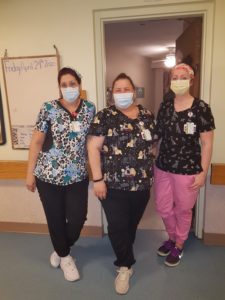
L to R: Tanya Miller, Debbie Panke, and Haley Jones, Personal Support Worker graduates working at Marianhill, Pembroke.
Recently, the Ontario government introduced a “pandemic pay” increase for some of these workers, acknowledging how great a need the province has for these employees during this national crisis. The four dollar per hour bump in pay impacts more than 350,000 workers including Personal Support Workers and Nurses who work in long-term care centres, a sector that has been particularly hard hit with outbreaks of the COVID-19 virus.
There was already a shortage of Personal Support Workers in many parts of the country, including Renfrew County, before the pandemic struck. Now, that labour market shortage is more acute.
Similar to how the 9-11 attacks on the United States in 2001 brought attention to careers in policing and security, the pandemic has shone a light on health career careers. Pictures and videos of exhausted health care staff, their faces left with a rash from hours of wearing personal protective masks, have become symbols of the pandemic.
The sincere admiration expressed to these healthcare heroes has been palpable. For example, through the College’s social media platforms, we have shared the stories of many of our current students and alumni who are working through the pandemic. Many have had to separate themselves from their families, or have worked excessive overtime to fill shifts. The heartfelt comments that have flooded these posts are all one has to read to understand the personal connection these individuals have to our community as family, friends, neighbours and college faculty and staff commend them for their service.
Florence Nightingale, the most revered nurse in history, once said, “Nursing is an art. It requires an exclusive devotion, the finest of fine arts.” During the COVID-19 pandemic, that devotion has been on display 24 hours a day.
The College is proud of its healthcare students and graduates and all essential workers who have been at the centre of the pandemic. Written words aren’t enough to express our gratitude as we acknowledge their talent, their commitment and their professionalism during this troubling time in our history.
They’ve stepped up for us. We need to continue to step up for them, by adhering to the policies in place concerning physical distancing that have so effectively helped to flatten the spread of the virus. As healthcare workers tell us daily, the pandemic isn’t over. Stay home. Stay safe.
Posted by Jamie Bramburger, Manager of Community and Student Affairs at Algonquin College’s Pembroke Waterfront Campus.
Posted on Monday, April 20th, 2020
Well, here we are. Just over a month in. You’ve made it to the end of this semester. I know these past few weeks have been challenging for you all. You’ve been navigating online learning and balancing school/work/home life during this surreal time. I hope exams and final assignments went well. For those who are graduating, congratulations! I imagine it feels odd to finish in this way. I’m sure it’s hard not to say goodbye in person to friends and faculty. For those entering into the spring semester, I’m sure you’re anxious about how it will look. For those of you who were looking forward to/counting on summer jobs and are facing financial uncertainty, I feel for you. I also know there’s so much I don’t know and can’t see. You are welcome to read my open letter about being a mental health professional during this time.
This is just a reminder that I am still available for virtual counselling. I will be working over the summer, so any student (even those in limbo with graduation) can reach out to me. I am available Tuesdays-Thursdays and you can contact me by email (sevigns@algonquincollege.com)
To support you as much as I can right now, below are a few resources. More are available on the Pembroke Counselling Website.
Take care of yourselves!
1) RESOURCE LIST: A LARGE LIST OF RESOURCES FOR COPING WITH DIFFERENT ASPECTS OF COVID-19
2) BLOG POST: “IN A WORLD CALLED CATASTROPHE: COPING WITH COVID-19”
3) PSYCHOEDUCATION VIDEO: “IF YOU CAN HOLD ON, HOLD ON: STRESS MANAGEMENT”
Also available in written format.
Posted on Sunday, March 29th, 2020
It happened quickly, but students at Algonquin College’s Pembroke Waterfront Campus are now completing their winter term online. The COVID-19 pandemic has created an unprecedented situation for the entire world, and as countries responded by enforcing physical distancing, it prompted post-secondary institutions to move curriculum that would normally be taught in classrooms, labs and in the workplace to an online format.

Starting on Monday, March 23, students who were accustomed to attending classes on campus were now engaging from their homes. The College knew this would be a big adjustment for both teachers and students, and so a variety of supports were put in place to support both parties. Faculty who had extensive experience teaching online rallied to support their colleagues and the College’s information technology and academic support teams put together a “super team” of trainers who introduced new online learning tools and best practices to ensure teachers were in the best position to deliver their classes virtually.
Across the College, teams of employees brainstormed and then put into action fresh ideas to build a toolbox of resources to support students. A great example is a learning kit portal that shares resources on how to succeed in online classes. There are videos on topics such as time management, studying and test-taking and delivering presentations. Another section puts students in contact with the College’s student support lab where they can set up virtual meetings with academic coaches who can help them better understand subject material in areas such as English, Math and Science.
The College uses Zoom technology to allow its faculty to deliver lectures and presentations to student remotely. The learning kit portal provides step-by-step directions to students on how to navigate their way through Zoom so they are comfortable using it. There’s also a Student Services User Guide that puts students in contact with the right college staff member who can help them, whether that is an academic advisor, a counsellor or a financial aid officer.
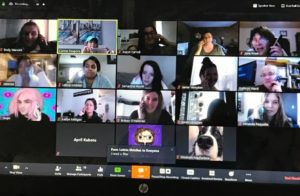
It hasn’t been an easy transition moving from a face-to-face educational model to an online campus in such a short period of time, but given the circumstances, there was no choice and there was limited time to make the transition. It’s been a learning experience for everyone, but our students and faculty deserve a lot of credit for their patience and willingness to adjust during a very difficult time.
For example, the College understands that with elementary and secondary schools closed, many college students have children at home as do some teachers. This sometimes leads to unexpected interruptions from younger family members or even pets. There’s an appreciation that life is happening in real-time for everyone and that the uncertainty of the pandemic is concerning for all. For that reason, the College is working very hard to be flexible and supportive of students as they navigate their way through what is a completely new learning environment for some of them.
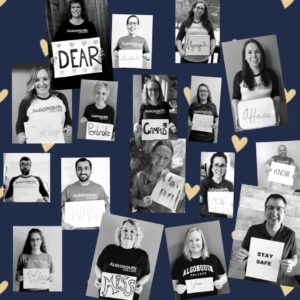
It will be some time before the Waterfront Campus re-opens to students for in-person classes, but out of this crisis will come many new opportunities for the College to better serve its learners. Developing a learner-driven plan that customizes the experience of students has been a priority for the College, and moving to an online platform of instruction, will certainly help generate new ideas of what the future student learning experience could look like. It’s an exciting concept, but a dialogue that will have to wait a bit longer as the College prioritizes its commitment to help students complete their academic term.
In the meantime, Algonquin College will continue to aspire to its mission to transform hopes and dreams into lifelong success. The College is just doing it in a different way, while also looking forward to a return to regular college operations when it is safe to do so. Be safe and be well.
Jamie Bramburger is the Manager of Community and Student Affairs at Algonquin College’s Pembroke Waterfront Campus. You can reach Jamie at brambuj@algonquincollege.com
Posted on Thursday, March 12th, 2020
Welcome to our Parents’ & Families’ Newsletter
With spring around the corner, we are midway through the winter semester. We thought it a perfect time to provide an update on activities that have recently happened and provide some insight into upcoming events.
Our goal is to keep you informed. While we respect the privacy of our students, the information we will provide in this newsletter will give you a good sense of what is happening on campus throughout the year and will provide you with enough information to have engaging conversations with your student. Enjoy our 2020 parent newsletter winter edition.
Next Steps in the Admissions Process
February 1st was a big day for College applicants. Colleges across Ontario started to make offers of admission, including Algonquin College. There are several key dates for applicants and their families to be aware of leading up to the start of classes in September 2020. They are:
- May 1st Confirmation Deadline: This is the deadline for applicants who have been made an offer of admission to confirm their intentions to enroll at the Pembroke Campus.
- June 15th Tuition Deposit Deadline: This is the deadline to pay the non-refundable $500 tuition deposit for the fall term or to complete a fee deferral through the College’s Financial Aid office.
- August 7th Documentation Deadline: This is the deadline for applicants to provide the college with any outstanding documentation such as transcripts for completed pre-requisites, health immunization records and police records checks, for applicable programs.
- Algonquin Advantage Days Orientation: Orientation for all Pembroke Campus students on September 3 and 4. Full schedules will be emailed and mailed to applicants.
Learn more about additional next steps.
 Meet our Campus Dean
Meet our Campus Dean
Dr. Keltie Jones became the sixth Dean in the 53-year history of the Pembroke Campus when she arrived from the Agricultural College of Dalhousie University in Truro, Nova Scotia last August. Dr. Jones is a graduate of Stanford University in California and has held leadership roles in post-secondary education in both Canada and the United States. She enjoys getting to know our students and her popular “Ask the Dean” sessions are enjoyed by students as it helps keep the lines of communication open with our students.
Dr. Jones enjoys engaging with parents and families and attends many of our student events. She looks forward to meeting you on campus.
Student Housing Options
With approximately 50 percent of students attending the Pembroke Waterfront Campus from out of town, student housing is an important consideration for both the College and families. While the College does not have a student residence, there are four privately owned and operated student residences that have the capacity to house more than 200 Algonquin College students.
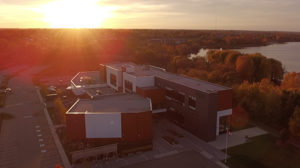
These residences all offer different housing experiences and are all within walking distance of the campus. They include Algonquin House, AMNA Student Housing, the Lake Street Residences, one of which is currently under construction but will be ready for the Fall 2020 term and Canoe Lofts, a new student housing complex that is also expected to open in September.
The College has a Housing List page which provides information to students and families on all accommodation options including its new Homestay Program. Homestay allows a student to live with a family in Pembroke and is primarily available to international students and newcomers to Canada who are looking for an enriched Canadian cultural experience while studying at college. The campus housing website will also provide detailed information on other housing options including rental units and room and board.
All decisions made by students and their families to enter into a lease agreement with a landlord are made independent of the college. Therefore, families are encouraged to do their due diligence when making decisions about housing.
Paws 4 Stress – Meet Winston!
Winston is our Pembroke Waterfront Campus Therapy Dog and member of our Dog Squad at Algonquin College. Winston is on campus every Wednesday this semester to help support our students and staff.
Getting Around Pembroke and Getting Back Home
As a smaller city, Pembroke is very walkable, however, it no longer has a public transit service. This can be problematic for students who do not have access to a vehicle. Therefore, students and families should take this into consideration when looking for housing options that are within walking distance of the campus.
Many students use bicycles to get to and from school. The College provides bike racks for students to lock up their bikes while they are in class. Other students carpool, but most walk to and from the college.
Out of town students have two bussing options if they are going home for weekends, statutory holidays or break weeks. Both Greyhound and Ontario Northland serve the city of Pembroke and travel to most medium and larger cities across the province. The bus stop is located at the Giant Tiger store in downtown Pembroke, a short walk from the College.
 Positive Space
Positive Space
The Positive Space program is organized by volunteers who work to create awareness of 2SLGBTQ+ communities at Algonquin College. The Positive Space program hosts events, conduct educational initiatives and shares information with all members of the campus community. Learn More →
Pembroke Area Offers Lots of Fun Activities in the Winter Months
Winter can be long and the Pembroke Area has experienced record snowfalls this year. The best way to get through winter is to embrace it. If you are the parent of a student who is currently studying at the Pembroke Campus, here are a few fun activities that you might suggest to your student to help them enjoy the winter season.
- Pembroke is home to a beautiful outdoor skating trail that is 1.5 kms long and curls through a forested area. The Laurentian Valley Skating Trail is only a 15-minute drive from the campus. If your student is interested in trying this free activity but doesn’t have transportation to get there, have them drop by student services where we can help arrange for carpooling.
- The Pembroke Lumber Kings Junior A hockey team plays most Sunday afternoons or evenings through the middle of March. Free tickets are often available through student services in Room 131. The Pembroke Memorial Centre, where the Lumber Kings play, is located across the street from the Waterfront Campus.
- If being outdoors is not for your student during the winter months, Festival Hall Centre for the Arts has plenty to offer with concerts, plays and engaging presentations all winter long.
- If your student is interested in history, Garrison Petawawa has an excellent military museum and the Champlain Trail Museum in Pembroke is well respected for providing a view into the Ottawa Valley’s past.
- The Waterfront Campus has a vibrant book club. Tell your student to drop by the Huckabone Library to get involved and start reading and discussing some of the best books on the market.
These are just a few ideas to help your student get through the winter months. Soon it will be spring!
City of Pembroke By-Laws
Like every municipality, the City of Pembroke has many by-laws that govern how the city operates. These by-laws provide important information that helps families and students understand how they apply to things like parking on city streets during the winter months, noise restrictions, fire department false alarms, and more. It’s a good website to bookmark on your computer. Learn More →
Employment Opportunities in Pembroke
Many of our students are looking for a part-time job while they study at our campus. Our Campus Employment Support Centre office is located in Student Services on the first floor of our campus and is well connected with local businesses that are looking for help.
Job postings are regularly updated and students can access free help with updating their resume and cover letter by dropping by to see our helpful staff.
Many of our programs offer opportunities for students to participate in paid co-op work placements. Students pay co-op administrative fees and must complete a series of learning activities and maintain a high academic standing to be eligible for co-op, but it’s worth it! Co-op provides an exceptional opportunity for students to gain relevant work experience within their field of study, opening up opportunities to get their foot in the door and launch their career. Learn more about the Co-op Experience.
We hope this newsletter has been helpful. Please keep in touch with us and offer us feedback on topics you would like us to cover in future newsletters.
Thank you for being part of your young adult’s post-secondary journey.
Posted on Wednesday, March 4th, 2020
Ironically, loneliness is a shared experience. Everyone has experienced loneliness at some point in their life, and if you are feeling this way right now you are definitely not the only student. Loneliness is caused by there being a discrepancy between the social and interpersonal connections you want and what you have. The focus on connection here is important: you may have a lot of friends and people around you, but it is the quality of those friendships and connections that influence the feeling of being alone.
Let’s be real here. Pembroke is a small town. This campus is a small campus. This means there are less options and opportunities for social events, activities, and just meeting “your people.” Homesickness, culture shock, and isolation are common and natural to experience in any new environment but are especially heightened in a small town/campus setting. Maybe you don’t feel connected to your classmates, roommates, or the college community. Maybe there are not as many social opportunities as you’d like or even solo activities in the area that fit your unique interests. Maybe you thought it would be different or you would feel differently by this point in the year. Maybe you’ve been trying to put yourself out there and are feeling rejected and dejected. All of this can feel very discouraging. So what can you do?
Practical Options for Dealing with Loneliness
- The first step is accepting the way you feel. Acknowledge that you feel alone or isolated and wish things were different.
- The second step is identifying what exactly you are missing. Are you missing companionship and just having others to do activities with, like going to the movies? Are you maybe more missing having someone you can connect with on a deeper level and feel unconditionally supported by?
- The third step is exploring how you can try or continue to try to combat your feelings of loneliness. This Practical Options for Dealing with Loneliness document reviews some practical options.
- The fourth step is considering if you can live with your loneliness. Yes, you might wish things were different, and loneliness is making you feel sad, but is this feeling tolerable? Can you accept that right now, for whatever reason, you may not have the social and personal connections you want in life? Is there a way to reframe this in terms of the value of having a lot of time to yourself, to focus on your own interests and passions or self-growth? Acceptance of your present circumstance, without judging it or wishing for it to be different, can help to lessen the feeling of distress that accompany loneliness.
Regardless of what steps you take to manage your feelings, I am always available as a support option on campus, even if I can’t replace friendship. Loneliness is difficult to experience and navigate out of, and it may also indicate that something deeper is going on.
I also want to hear what the student community wants for support moving forward. Next week, I will be sending out an email listing some options for social and counselling groups to be offered over the spring/summer semester, and options for Fall 2020.
Shannon – Counsellor, M.C., RP, CCC
Room/Office 138
T 613.735.4700 x2804
Counselling website
Posted on Monday, February 24th, 2020
Maximizing the potential of your employees should be a priority for every business. That’s the focus of the 2020 Spring Business and Leadership Conference scheduled for May 21 at Algonquin College’s Pembroke Waterfront Campus.
Now into its sixth  year, the conference supports local organizations by providing high quality and affordable professional development opportunity close to home. This year’s headliner is Doctor Robyne Hanley-Dafoe who will deliver a poignant keynote address on resiliency in the workplace.
year, the conference supports local organizations by providing high quality and affordable professional development opportunity close to home. This year’s headliner is Doctor Robyne Hanley-Dafoe who will deliver a poignant keynote address on resiliency in the workplace.
As the senior educational developer for the Centre of Teaching and Learning at Trent University in Peterborough, Hanley-Dafoe is a multi-award winning psychology instructor who specializes in navigating stress and change with a focus on personal wellness in the workplace.
Hanley-Dafoe will be joined by five other women in producing the first all-women line-up of presenters in the conference’s history. All will focus on topics that will drive improvement within organizations.
For example, Iman Haasan will provide tips on how to promote health and wellness in the workplace through lessons learned from sports psychology. Hassan is a mental health performance consultant who is also a Sport Performance and Psychology doctoral student at the University of Ottawa.
 Colleen Walsh has spent more than 20 years helping businesses solve human resources issues. She has entitled her workshop as “The Modern-Day Performance Management Process.” From Walsh’s perspective, there is a lot of discontent with the way employers evaluate employee performance. Her workshop will focus on how to provide constructive criticism that will motivate your employees to build stronger working relationships.
Colleen Walsh has spent more than 20 years helping businesses solve human resources issues. She has entitled her workshop as “The Modern-Day Performance Management Process.” From Walsh’s perspective, there is a lot of discontent with the way employers evaluate employee performance. Her workshop will focus on how to provide constructive criticism that will motivate your employees to build stronger working relationships.
Within a work team, everyone has different responsibilities, but when someone lets the team down it can cause a lot of tension. Victoria Miles is an employee engagement specialist and will deliver a punchy presentation on “Demystifying Accountability,” an interactive workshop that will tackle questions like, what does accountability look like when it’s in action? Most importantly, the session will drill down on why accountability is so important in the workplace and will provide tips on how to introduce it as an employee engagement priority.
Why do so many projects fail? Becky Wright is a certified project manager and will explore the most common reasons why projects don’t succeed. Through group work, Wright will help her audience understand how poor planning is usually to blame and more importantly will delve into what organizations can do to learn from their past failures to plan better.
 Erin Blaskie is a social media guru, but she’s also a leading entrepreneur. A lover of technology, Blaskie helps entrepreneurs achieve their goals by inspiring them to achieve greatness, while also understanding the pitfalls that often derail entrepreneurs. In her enlightening session, Blaskie will tackle the question of what does it mean to be an entrapreneur within an organization? In answering that question, Blaskie will be promoting the need for more creativity and innovation to drive business growth and build successful teams.
Erin Blaskie is a social media guru, but she’s also a leading entrepreneur. A lover of technology, Blaskie helps entrepreneurs achieve their goals by inspiring them to achieve greatness, while also understanding the pitfalls that often derail entrepreneurs. In her enlightening session, Blaskie will tackle the question of what does it mean to be an entrapreneur within an organization? In answering that question, Blaskie will be promoting the need for more creativity and innovation to drive business growth and build successful teams.
Registration has opened for the conference. Early bird rates of only $210 plus applicable taxes are in place until March 31 and businesses that register three people for the conference will receive the fourth registration free.
Posted by Jamie Bramburger, Manager of Community and Student Affairs at Algonquin College’s Pembroke Waterfront Campus.
Posted on Wednesday, February 12th, 2020
 Calling all students! Algonquin College’s Pembroke Campus is hosting a photography contest! Rules are simple,
Calling all students! Algonquin College’s Pembroke Campus is hosting a photography contest! Rules are simple,
- Submit a picture of what inspires you the most in the classroom, in placement, or in the field.
- Provide a brief explanation about why you chose this image to be entered into the contest.
- Only one entry per student – so make it unforgettable!
- Submit by March 6, 2020 at 11:59 p.m.
Submissions will be judged based on both the photo and the written explanation, so remember to include each in your entry! Both 1st and 2nd place winners will be featured in our upcoming Pembroke Campus newsletter. For those wishing to enter please email all submissions to raem@algonquincollege.com by March 6, 2020.
Posted on Monday, February 10th, 2020
At some point, you may ask, “Why should I go to college?” Here are five reasons to study at our campus:
-
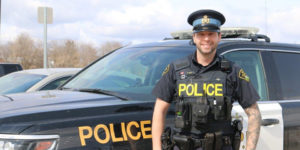 We prepare you for your future career – learn the skills to get the job: Research reveals 86% of college graduates secure employment within six months. College education continues to be an effective and swift route to employment. The provincial Key Performance Indicators (KPIs) show that 85.5% of Algonquin College graduates found employment within six months of graduation. “Colleges are experts at helping people find rewarding careers,” said Linda Franklin, the president, and CEO of Colleges Ontario. “Our graduates’ professional and technical expertise will be even more important in the years ahead as new technology and automation create a heightened demand for a more highly qualified workforce.” There’s no question that having a post-secondary credential has become paramount to a person’s ability to progress in the workplace. Increasingly, employers are asking for a minimum of a college certificate or diploma as a starting point to be considered for a job posting. That reality is the primary factor that drives a person’s decision to enroll in a college program.
We prepare you for your future career – learn the skills to get the job: Research reveals 86% of college graduates secure employment within six months. College education continues to be an effective and swift route to employment. The provincial Key Performance Indicators (KPIs) show that 85.5% of Algonquin College graduates found employment within six months of graduation. “Colleges are experts at helping people find rewarding careers,” said Linda Franklin, the president, and CEO of Colleges Ontario. “Our graduates’ professional and technical expertise will be even more important in the years ahead as new technology and automation create a heightened demand for a more highly qualified workforce.” There’s no question that having a post-secondary credential has become paramount to a person’s ability to progress in the workplace. Increasingly, employers are asking for a minimum of a college certificate or diploma as a starting point to be considered for a job posting. That reality is the primary factor that drives a person’s decision to enroll in a college program.
-
You’re not just a number – we get to know you: At the Pembroke Waterfront Campus, you’re not just a number – we get to know you, your name, and your goals – your opinion is valued. Our campus feels smaller and homier than others, and we are always here to help. Our Support Services team works together to support you based on interactions with you. The best way that we can support you to achieve success is through planning and collaboration within the College’s support services.
-
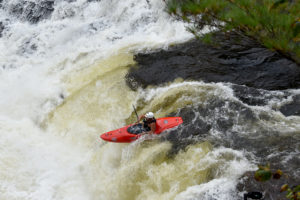 We offer one-of-a-kind programs – you won’t find anywhere else: We offer a number of truly one-of-a-kind programs, with a strong reputation across Canada and internationally. Our beautiful campus is surrounded by scenic countryside, forests, lakes, and rivers–the perfect location for some of the most exhilarating outdoor training programs on earth. Whether you are interested in building the action sports culture, learning how to preserve the present for the future, or looking to become an outdoor guide, we have the programs and certifications that will guide you toward your dream career! Learn more about our programs.
We offer one-of-a-kind programs – you won’t find anywhere else: We offer a number of truly one-of-a-kind programs, with a strong reputation across Canada and internationally. Our beautiful campus is surrounded by scenic countryside, forests, lakes, and rivers–the perfect location for some of the most exhilarating outdoor training programs on earth. Whether you are interested in building the action sports culture, learning how to preserve the present for the future, or looking to become an outdoor guide, we have the programs and certifications that will guide you toward your dream career! Learn more about our programs.
-
We’re generous – bursaries help pay your tuition: A bursary is a monetary award that is granted on the basis of financial need. Bursaries are different than scholarships. Scholarships are merit-based and are awarded for academic achievement. Bursaries are financial-need based awards that do not have to be repaid. We have over $250,000 available in bursaries money annually for our Pembroke Campus students. These generous gifts of money from our community members and local businesses are truly appreciated by the students and the College. It helps the college to fulfill its overarching goal of supporting students to be successful in their academic studies and to be career-ready when they graduate. Learn more about
-
Our small campus provides more opportunity to connect to your professors: Your professors are experts in their chosen field, so they can help you to succeed academically. Whether you need help to answer questions or clarify materials that are covered in class, you have the opportunity to get that extra one-on-one time at our campus. Professors also know people and have many connections, so when it comes time for you to secure a co-op, placement or even a job, they can reach out to companies who are looking for qualified individuals and speak with them on your behalf.
Join us and learn first-hand the advantages of studying at a smaller campus where we offer our students exceptional learning opportunities and a friendly, supportive environment.


 Like MacDonald, Kowalski saw the potential in a partnership with the College. “This was exactly what the industry needed. It helped bring credibility to the adventure tourism sector and we were very proud to be pioneers with Algonquin College in developing the most successful Outdoor Adventure program on the planet,” says Kowalski who himself is into his fifth decade of owning an adventure tourism business.
Like MacDonald, Kowalski saw the potential in a partnership with the College. “This was exactly what the industry needed. It helped bring credibility to the adventure tourism sector and we were very proud to be pioneers with Algonquin College in developing the most successful Outdoor Adventure program on the planet,” says Kowalski who himself is into his fifth decade of owning an adventure tourism business.  Among the students who enrolled that first year was Ben Shillington who had no intention of continuing on to post-secondary education. ” Upon graduation from high school, my plan was to bicycle solo and self-supported across Canada. After arriving on the West Coast, I planned to find a place to train in both whitewater rafting and mountaineering. Shortly before graduating high school, my guidance counsellor gave me a sheet of paper highlighting a new program still pending approval called “Outdoor Adventure Guide Diploma” With a list of training and certification in everything from mountain biking to scuba diving and ice climbing along with some in-class education I couldn’t think of a better bang for buck opportunity.”
Among the students who enrolled that first year was Ben Shillington who had no intention of continuing on to post-secondary education. ” Upon graduation from high school, my plan was to bicycle solo and self-supported across Canada. After arriving on the West Coast, I planned to find a place to train in both whitewater rafting and mountaineering. Shortly before graduating high school, my guidance counsellor gave me a sheet of paper highlighting a new program still pending approval called “Outdoor Adventure Guide Diploma” With a list of training and certification in everything from mountain biking to scuba diving and ice climbing along with some in-class education I couldn’t think of a better bang for buck opportunity.”

 2020 SPRING BURSARY CYCLE: April 30, 2020 TO June 8, 2020
2020 SPRING BURSARY CYCLE: April 30, 2020 TO June 8, 2020





 Meet our Campus Dean
Meet our Campus Dean
 Positive Space
Positive Space


 Calling all students! Algonquin College’s Pembroke Campus is hosting a photography contest! Rules are simple,
Calling all students! Algonquin College’s Pembroke Campus is hosting a photography contest! Rules are simple, We prepare you for your future career – learn the skills to get the job: Research reveals 86% of college graduates secure employment within six months. College education continues to be an effective and swift route to employment. The provincial
We prepare you for your future career – learn the skills to get the job: Research reveals 86% of college graduates secure employment within six months. College education continues to be an effective and swift route to employment. The provincial  We offer one-of-a-kind programs – you won’t find anywhere else: We offer a number of truly one-of-a-kind programs, with a strong reputation across Canada and internationally. Our beautiful campus is surrounded by scenic countryside, forests, lakes, and rivers–the perfect location for some of the most exhilarating outdoor training programs on earth. Whether you are interested in building the action sports culture, learning how to preserve the present for the future, or looking to become an outdoor guide, we have the programs and certifications that will guide you toward your dream career!
We offer one-of-a-kind programs – you won’t find anywhere else: We offer a number of truly one-of-a-kind programs, with a strong reputation across Canada and internationally. Our beautiful campus is surrounded by scenic countryside, forests, lakes, and rivers–the perfect location for some of the most exhilarating outdoor training programs on earth. Whether you are interested in building the action sports culture, learning how to preserve the present for the future, or looking to become an outdoor guide, we have the programs and certifications that will guide you toward your dream career!